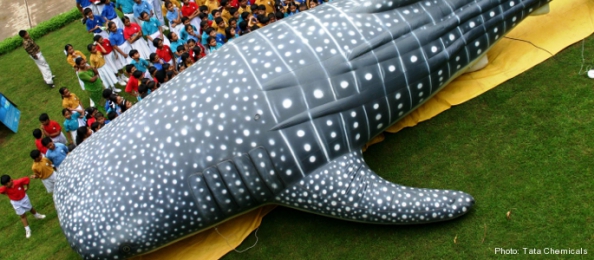The Whale Shark Campaign
One of India’s most successful and internationally acclaimed conservation projects, the Whale Shark Campaign, is a collaboration of Wildlife Trust of India, the International Fund for Animal Welfare, Tata Chemicals Limited, and the Gujarat Forest Department. The campaign was initiated in January 2004 to spread awareness and to educate and change perceptions about the world’s largest fish among specific target groups in the western Indian state of Gujarat.
Whale sharks are the world’s largest fish and were slaughtered in large numbers on the Gujarat coast until the species was listed under Schedule I of the Indian Wildlife (Protection) Act, 1972 (under sub section (1) of section 61) on May 28, 2001. The effectiveness of the whale shark campaign in Gujarat has proven to be outstanding, as the turnaround recovery period for this brutally hunted species has come within the first four years of the campaign’s initiation. Close to 100 trapped whale sharks have been voluntarily released by fishermen since the start of the campaign.
It would normally take about 10 years for the conservation of a commercially exploited species to kick in, but here we have managed to cut through time and limited resources to activate a response in four years on the strength of the concept of the campaign. It was a combination of key ideas: We provided information on the species; created a flagship with a life-size inflatable whale shark that drew people wherever it was taken; the spiritual ambassador, Morari Bapu, connected emotionally to the traditional and cultural ethics of local people and fishing communities. A huge groundswell of support was generated from young people and schoolchildren and the effects of the campaign were consistently and professionally surveyed. Today, all those who collaborated on this effort can finally hope that whale sharks in India are in safe waters.
Backround
Whale sharks are the largest fish in the ocean and can grow up to 45 feet in length. In India they are found most frequently in the Arabian Sea along the shores of Gujarat in western India. Unfortunately, here it was hunted by the hundreds for its liver oil to waterproof boats and also for its meat, which was exported. In 2000–2001, over 500 whale sharks were estimated to have been massacred along the Gujarat coast.
Other than the fishermen who hunted it, few people even knew that whale sharks existed in Gujarat waters. Whale sharks were called “barrels” here, as empty barrels were used as floaters to mark and capture them after harpooning.
Each hunted whale shark brought fishermen US$1,125 – 2,250, making it a lucrative catch. Legal until 2001, whale shark hunting was banned after it became the first fish to be listed under Schedule I of the Wildlife (Protection) Act, 1972, under sub section (1) of section 61, on May 28, 2001. The following year, persistent efforts by India and the Philippines got the whale shark placed under Appendix II of the Convention for International Trade in Endangered Species.
However, the whale shark remained vulnerable on these shores. A survey done indicated low awareness of this hunted species and prompted the need for a campaign among the fishing community and other stakeholders to conserve these “gentle giants” and ensure their longer-term survival.
This project description was originally presented in the Global Compact International Yearbook 2010.
Sujit Patil is Head of Corporate Communications at TATA Chemicals, India.
About Us // Privacy Policy // Copyright Information // Legal Disclaimer // Contact
Copyright © 2012-2018 macondo publishing GmbH. All rights reserved.
The CSR Academy is an independent learning platform of the macondo publishing group.









